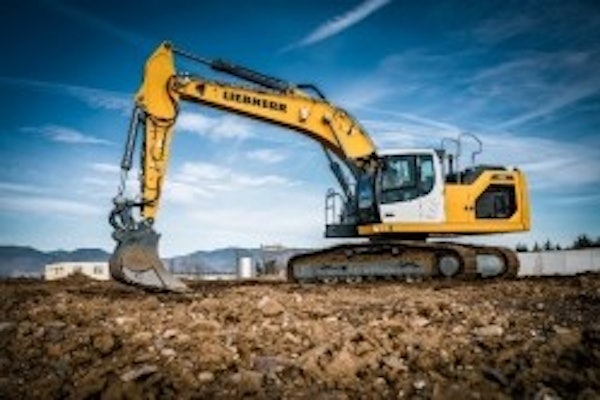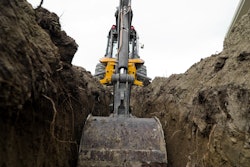Tucked in the northeastern corner of Tennessee, an area tightly connected with the neighboring states of Virginia and North Carolina, William Taylor’s firm, W.A. Taylor Construction, has grown with the popularity of this scenic area.
Taylor set his sights on construction while in college at East Tennessee State University, where he graduated with a degree in what is now the construction management program. He then worked for a couple of general contractors in the Bristol, Tennessee, area, but one major problem cropped up: The work required travel, and Taylor wanted to stay closer to his growing family.
Using the “little bit of everything” skills he’d gained with the general contractors – including estimating, project management, field supervision and procurement – Taylor started building homes in 1993. “Still, I wanted to get back into the commercial and industrial work I’d been doing before,” he says.
By 1997, Taylor had zeroed in concrete construction. “The market was fairly wide open at the time,” he says, “and I really enjoy working with heavy formwork.” His first job: a Circuit City store. His company did the concrete package, including foundations, slabs and sidewalks.
W.A. Taylor Construction now does concrete construction for a variety of industrial and commercial clients. Taylor describes the firm as a “general contractor that specializes in concrete.”
Depending on the season, the firm has around 45 employees, and runs about seven crews. Of course, each crew needs supervision. “Over the years, we’ve tried to find people who suit the style of operation and commitment we have,” Taylor says. “We want to do safe, quality work that’s profitable.”
The company has maintained a consistent growth profile since 1996, when it recorded $1.2 million in sales. There have been some ups and downs – including 2000 and 2001, when sales went as high as $3.8 million then decreased to $2.5 million in 2003. But now the company’s sales volume is back up again, and in 2005 to 2006 it saw a jump from $2.5 million to $4.5 million, almost doubling in 18 months.
This growth is no surprise to those observing the company first hand. “Bill is one of the best guys in the business,” says Perry Henson, sales manager for concrete materials vendor Enco Materials, Johnson City, Tennessee. “He’s sharp and he knows his trade, having started as a laborer and worked his way up. Because of this, he realizes what his field guys need and knows the flow of work.”
A multitasking pro
“You have to make the commitment and work at it,” Taylor says, as he considers the path his firm has taken to date. “You’ve got to strive to have good quality and get the production. Just be prepared to put in the time.”
As an example, Taylor cites one of the company’s more challenging tasks – working on a five-story federal courthouse in Greenville, Tennessee, while at the same time doing the concrete work at a 230,000-square-foot aluminum extrusion plant in the same city.
Taylor says the key to handling such jobs is working multiple crews at the same time and multitasking. For example, during the company’s largest contract to date, a $2.6-million concrete subcontract for the Tazewell Medium Security Correctional Facility in Pocahontas, Virginia, Taylor ran an excavation crew, two form crews, a prep crew, a finishing crew and a clean-up crew. “That requires some great supervisors and foremen,” he says, “especially since they were working about 130 miles away.”
“His crews were absolutely motivated to put the time in to get the job done,” says Dave Jones, project manager, Centex Construction, general contractor on the prison project. “They were working when it was basically frozen tundra from November to March, and it’s admirable how they pushed through in those conditions, putting in footers, slabs and sidewalks and dealing with the huge amount of underground infrastructure. We look forward to working them on another job.”
This ability also came to play when W. A. Taylor Construction had a concrete subcontract at the Weyerhaeuser plant in Kingsport, Tennessee. “There was a lot involved in the work,” Taylor says, “including heavy machine foundations and wall work. It had a tight schedule, so we were pushed to the limit every day.”
“If you’re going to work for us, you’re going to work long hours,” agrees Dave Plunkett with Weyerhaeuser. “I’ve never had an issue with them if I have a deadline or if something breaks. They were right there to help me.”
Taylor says the industrial work enabled his firm to raise its level of thinking and operation. “You can’t be complacent, especially about safety. When you step up your safety program, you really have to watch your tools, your equipment and the way you do things a lot more.”
Tight schedules are also the name of the game when you work for the contractors who build national retail chains. “They have a schedule and there’s not a lot of room for wasted time, because they have to move on,” Taylor explains. “It’s led to the rise of a lot of niche subcontractors.”
Taylor’s on-the-job flexibility also has its admirers. After working with the Taylor firm on the Wellmont Health System-Holston Valley Medical Center parking garage in Kingsport, Tennessee, Tony Politz with general contractor Robins & Morton, comments: “W. A. Taylor Construction overcame unforeseen conditions such as rock excavation at the spread footing locations and dewatering at the shear wall footings’ rock anchors, and gave us one of the better final finish concrete appearances we have seen across the country.” Another point of praise: the firm’s site clean up. “We continually use this firm as the example of how Robins & Morton expects the jobsite to be maintained,” Politz concludes.
At-the-ready attitude
This at-the-ready attitude also influences Taylor’s fleet management decisions. “Owning equipment is more profitable in the long term,” Taylor says. “It’s also comforting to our client to know that in a rush or emergency situation, the equipment will be there to complete the job, especially in remote areas.” Taylor’s fleet includes a backhoe, skid-steer loaders, mini excavators, a telehandler and a small smooth-drum roller.
But like most contractors, Taylor does rent. Besides the occasional extra machines required for specific jobs, Taylor also rents a concrete pump with an operator when the need arises. “That’s just too large of a piece of equipment for us,” he says.
Because Taylor jobs require so much formwork, the company owns about 10,000 square feet of formwork. “It’s about two trailer loads,” Taylor says. “It’s a pretty sizeable investment.” Taylor also rents forms, especially the traveling forms he uses on jobs that have tight time restrictions.
After they experienced an $8,000 theft on rural bridge job, the company switched from using rental storage trailers to gang boxes for storing equipment. “With the trailers, they could just break a lock and go in,” Taylor comments. “With gang boxes, you can keep them tied down, chained together and bolted up. It works a lot better.”
Not a one-man operation
The company moved into its present offices – located in a strip office structure they built – about three years ago. Taylor added a 5,000-square-foot warehouse to the side of the office building in 2006. “Not only had we outgrown our office space at our old location, but we found ourselves keeping more stuff outside than we wanted to,” Taylor says.
Taylor is not alone in his new quarters. “I’m hardly a one-man gang,” says Taylor, who attributes the quality of people they hire to Tammy, his wife, who has handled the office since the company started. “She manages all the accounting, insurance and taxes,” he comments. “During peak times, I’m out of the office three days a week, so she’s the mainstay,” he says.
As if Tammy didn’t have enough to keep her busy, she also manages the 30 commercial and residential properties the couple owns. The couple has two daughters, Lauren, 16, and Lindsay, 13.
Excellent prospects
When Equipment World talked to him earlier this year, Taylor was anticipating one of the “best-looking outlooks I’ve seen” for commercial, governmental and industrial work. “There’s a lot of school construction going on, including a new pharmacy college at East Tennessee State University,” he says. And because the area’s population is growing, the retail sector has been strong for several years.
Taylor thinks his future growth will be geographic. “I’d like to see us working in about a 200-mile radius,” he says. He also wants to closely examine the markets he’s in and perhaps “get a bit selective in the next years in the type of work we do,” he says.
But however much the firm expands, Taylor doesn’t want to change the two things he thinks sets his firm apart: quality and speed. “We’ve learned how to push these jobs, while still maintaining the quality,” he says.






